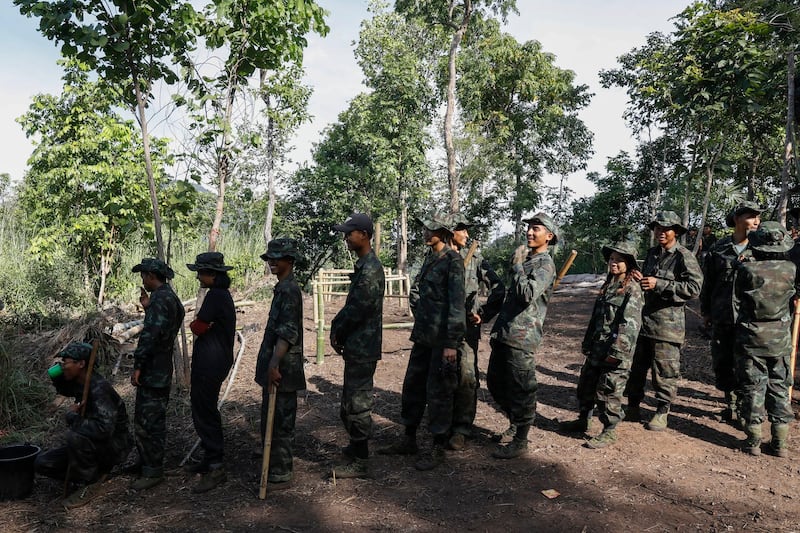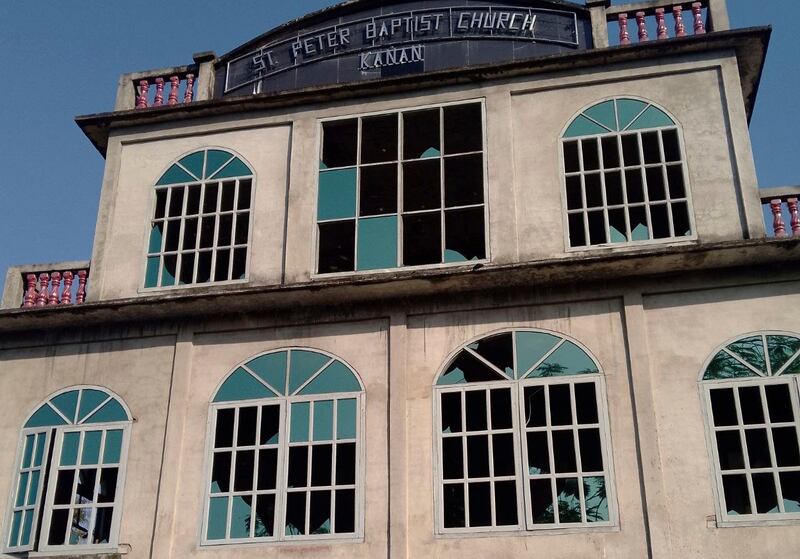Myanmar’s shadow National Unity Government has claimed administrative control of four key towns in the northern region of Sagaing following their fall to resistance forces, but residents say they still live in constant fear of attacks by the military.
Beginning in November, anti-junta forces seized the towns of Kawlin, Khampat, Shwe Pyi Aye and Maw Lu. National Unity Government, or NUG, officials entered the towns shortly afterward and set up basic administrative services.
“The civil administrative mechanism was put in place after the first round of conflicts,” said an information officer with the People’s Administration Organization in Khampat who, like others interviewed for this report, spoke to RFA Burmese on condition of anonymity due to security concerns.
“The town is now firmly under the control of the NUG and the People’s Administration Organization is formed and functioning,” he said.
But a series of junta attacks on the towns since their seizure have left residents fearing for their safety, and some who have fled their homes say they are reluctant to return.
From Dec. 10-16, Khampat township was the center of fierce fighting due to incursions by junta forces, while on Jan. 7, the military conducted airstrikes that hit a church service in the township’s Ka Nan village, killing 17 civilians, including nine children, and injuring 19 others, according to a report by the NUG.
“It is safer to travel than before due to fewer security checkpoints,” a resident of the township told RFA Burmese. “But we are constantly alert to loud noises of cars and motorcycles, as we live in fear of airstrikes. We are still worried that fighting will resume.”

Similarly, a joint force of anti-junta fighters under the NUG and members of the ethnic Kachin Independence Army seized Kawlin on Nov. 6, and the NUG began administering the town on Dec. 6.
But residents told RFA that civilians have since been killed by junta artillery attacks and said transporting goods around the area remains unsafe.
“The junta is blocking cargo trucks and travelers into Kawlin … so there are many difficulties affecting the flow of commodities,” one inhabitant of the town said. “The junta’s Light Infantry Battalion No. 120 fires artillery shells from [nearby] Wuntho township ... [and] more than 10 civilians were killed after the town fell under the control of resistance forces.”
Residents said that on Jan. 2, a junta artillery attack on Kawlin’s market killed six civilians, and injured two. Five days later, the bodies of 19 civilians killed by the military council were discovered near Wuntho township, six of whom were from Kawlin, they said.
NUG governing with ‘all possible resources’
Some residents told RFA that they feel they have the right to expect better protection from the NUG, now that the shadow government has assumed administrative control in their towns.
Kyaw Zaw, the spokesperson of the NUG President’s Office, said that his administration is doing the best it can with the resources in the areas under its control.
“We are implementing civil administrative mechanisms with all possible resources, while our defense forces are working to prevent attacks by the junta,” he said.
He added that the NUG has established interim administration in more than 170 townships across the country, and is working to enhance rule of law, development, education, health and the economy.
In other towns, the NUG has faced challenges implementing its goals, acknowledged a member of the People’s Administration Organization in Maw Lu township, who also declined to be named citing fear of reprisal.
“We have experienced some difficulties in the administrative process as we are not civil service personnel,” he said of the town, which was seized by a joint force of the Kachin Independence Army, the All Burma Students’ Democratic Front, and anti-junta People’s Defense Force paramilitaries on Dec. 13.

A resident of Maw Lu confirmed that inhabitants have “many needs” at the moment.
“We have been relieved from some adversities [under the junta], but frankly, we don’t enjoy total peace,” the resident said. “We expect a genuine democracy, in which an administration treats us humanely. We hope the people will not have to suffer much longer and that the end of revolution will come as soon as possible.”
The junta has issued no statements about the towns it lost to the NUG in Sagaing region.
According to a Nov. 28 report by the independent research group ISP-Myanmar, which documents the impact of conflict on civilians in the country, at least 119 armed clashes took place in Sagaing since the Oct. 27 launch of Operation 1027, an offensive led by the Three Brotherhood Alliance of ethnic armies.
Translated by Aung Naing. Edited by Joshua Lipes and Matt Reed.
